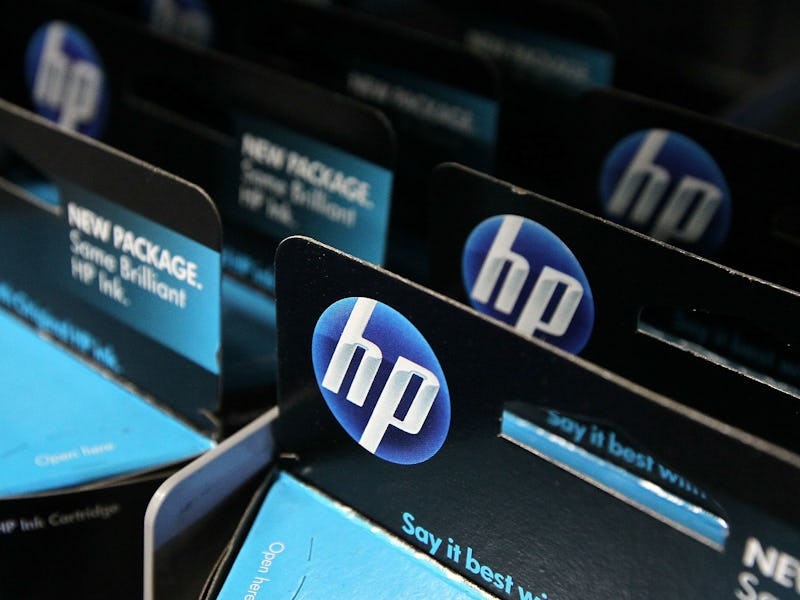After Intense Pressure, HP Relents on Ridiculous Printer Restrictions
"Interoperability is central to how modern technologies work."

Hewlett-Packard attempted to sneak firmware that would place major unanticipated restrictions on how its printers function, but the computing giant relented after it was met with intense pushback from activists who say the type of technology it used is massively unfair to consumers — and is a looming threat to all modern technology.
In a recent software update, HP snuck digital rights management technology, which retroactively controls how a device works, into previously purchased Officejet Pro printers. The DRM firmware, as it’s known, prevented the printers from being able to use otherwise perfectly good third-party cartridges.
In addition to being, well, a dick move towards consumers who want the ability to use a device that they purchased the way that they want, HP’s decision is also a high-profile example of the potential harm DRM schemes and the 1996 Digital Millennium Copyright Act that protects them can wreak. That’s why the Electronic Frontier Foundation launched a campaign that successfully drove HP to undo at least some of the damage it’s done, but the EFF really wants to forestall any future dismay as well.
The EFF asked HP to apologize to its customers and undo the DRM update, and to pledge to be fully transparent and truthful with its software updates going forward. A petition has already garnered close to 10,000 signees.
This whole incident could, potentially, be a landmark incident in the fight against DRM technology and laws — or at least it will raise awareness in a big way. “HP’s example is not just egregious by readily graspable,” Cory Doctorow, who penned the EFF’s letter to HP, told Inverse in a phone conversation before HP recanted.
HP issued a response on Wednesday announcing it would issue an optional firmware update that will undo the previous update. “We should have done a better job of communicating about the authentication procedure to customers, and we apologize,” the statement from HP’s chief operating officer, John Flaxman, read.
However, HP did not rule out using similar DRM firmware in the future that could ultimately have the same effect on consumers’ printers. “We will continue to use security features to protect the quality of our customer experience, maintain the integrity of our printing systems, and protect our IP including authentication methods that may prevent some third-party supplies from working,” the letter read.
It’s a victory for activists like those at the EFF, but a small one. DRM technology and the laws behind it are a much larger issue, and as HP suggested in the closening statements of its letter, one that isn’t going away completely anytime soon.
“Part of why I think this story has caught so many peoples’ attention is because a lot of people are used to only thinking about DRM in terms of like audiobooks or music downloads and things like that,” Elliot Harmon, an activist at the EFF, told Inverse in a separat conversation. “When, in fact, the technologies that are potentially implicated by DRM are everything from cars to tractors to — basically any kind of technology that has an onboard computer on it.”
While DRM technology is a headache for, say, an office manager who just ordered a giant box of third-party cartridges for their company’s fleet of HP printers, there’s a more insidious legal force protecting these dodgy corporate tactics.
“The issue here is not DRM — though it is a bad idea to design a computer to keep secrets from its owner,” Doctorow said. “The real issue is DMCA.”
The 20th Century law makes any attempt to circumvent DRM technology a potential crime, meaning that consumers essentially lack the ability to make a choice without violating copyright law.
“There’s a difference, usually, between commercial preference and legal rights,” he said.
“Interoperability is central to how modern technologies work. The ability to choose the best product because it’s the best quality product and not because you’ve been locked into this certain system by a manufacturer,” Harmon said. “That’s really kind of a basic cornerstone of modern technology.”
HP is under fire for sneakily implementing DRM technology on a bunch of its printers.
HP introduced the DRM software to the affected computers by hiding it behind a “security update.” It then lay in wait until HP activated it, suddenly rendering all third-party ink cartridges useless. This underhanded implementation, the EFF says, doesn’t just mislead and dupe consumers — it undermines cybersecurity as a whole.
“What happens when these kinds of anti-features, as we sometimes call them, get masqueraded as security updates?” Harmon asked. “It has this very literal detriment to society in that it makes people reluctant to install security updates.”
DRM technology is widespread — and it’s easy to see why a corporation might want to force consumers to only be able to spend money on its products. Doctorow, however, is largely hopeful that understandable, high-profile cases like the HP debacle can help raise awareness needed to stem the tide and push back against the trend.
“We don’t think it’s inevitable at all,” Doctorow said, noting that higher profile and understandable examples of DRM technology were “catching up with us.”
“The question,” he added, “is by the time we catch up with the idea that 1998 called and wants its internet back, will we have gone so far down the line that it’s too late?”